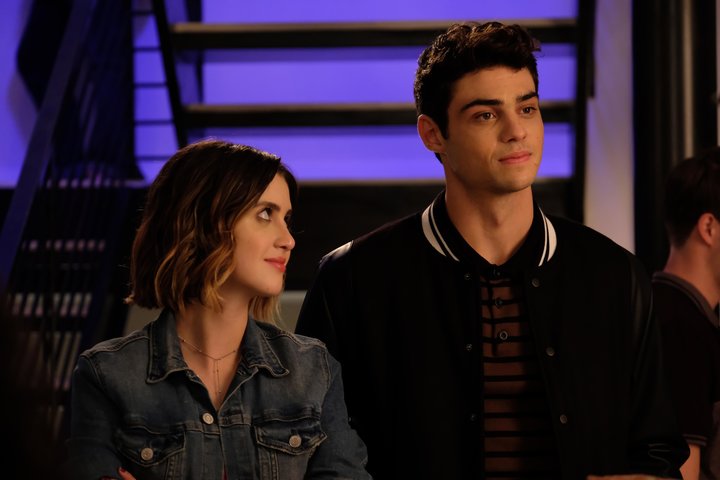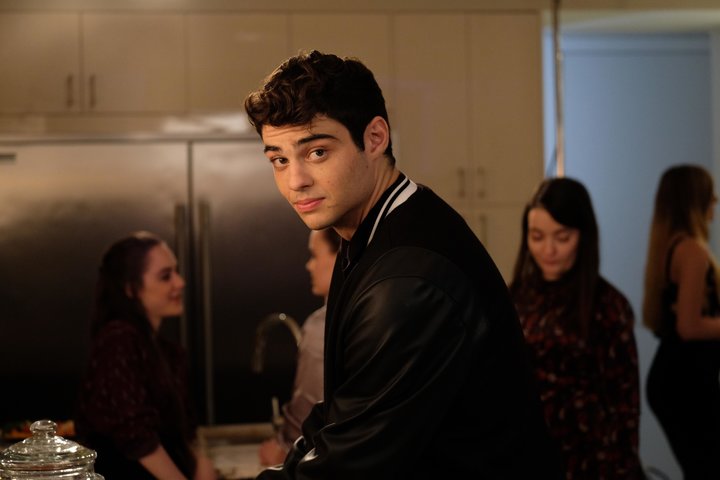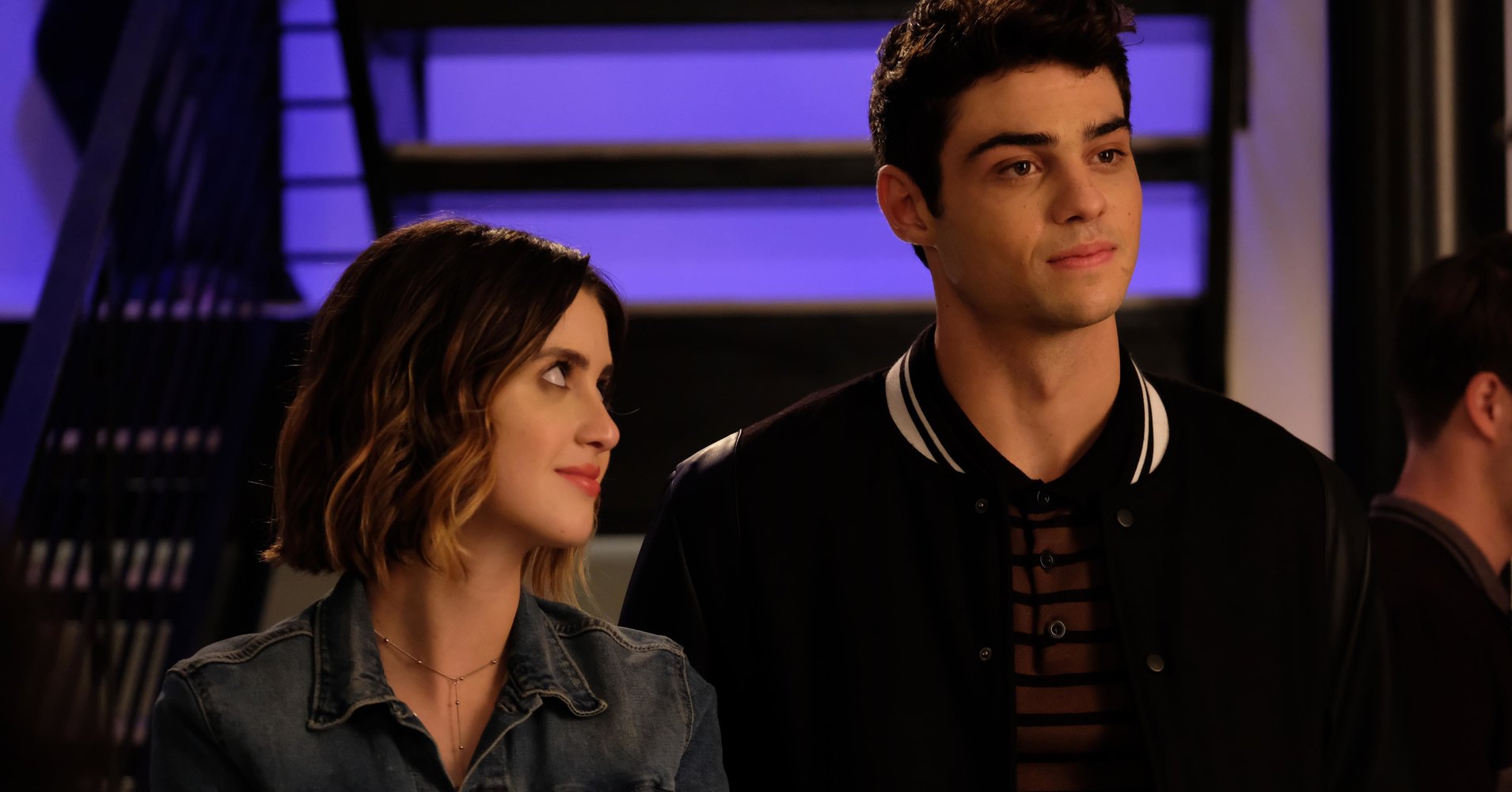[ad_1]
In 2019, surely no actor could carry a movie titled “The Perfect Date” other than Noah Centineo, breakout star of the summer hit “To All the Boys I’ve Loved Before.” He’s such a charismatic romantic lead that female journalists fell over themselves to profile him, describing just what it feels like to have him spinning you around by your back pocket.
Fittingly, his latest Netflix film has him doing almost exactly that: play-acting at being a date for girls eager to spend an evening with their ideal guy. Brooks Rattigan, his character, is an ambitious high school student with his sights set on Yale ― and, peripherally, the hottest girl and the flashiest car. After a fortuitous opportunity to make serious cash taking a classmate’s unpopular (but, spoiler, incredibly beautiful and stylish) cousin, Celia (Laura Marano), to her school formal, he realizes that he can earn money for his dream school by hanging up his shingle as a for-profit escort. He can be funny, he can be serious, he can take you to an ’80s-themed party or to a coffee shop for practice making conversation! And then ― believe it or not ― he can fall in love.
It’s no more ludicrous a setup than most teen rom-coms rely on ― but does it have that X factor that sets “10 Things I Hate About You” apart from, say, “Drive Me Crazy”?
If you’re a Centineo superfan, if you marked April 12 on your calendar with a big heart so that you’d remember to watch “The Perfect Date” the moment it dropped on Netflix, you probably don’t need any guidance as to whether to watch this movie. But for the rest of you, HuffPost’s Emma Gray and Claire Fallon discussed the strengths and weaknesses of his latest star vehicle ― and whether it’s a good use of an hour and a half on the couch.
Claire: Cheryl Frasier would say the perfect date is April 25: It’s not too hot or too cold, and all you need is a light jacket. But others might say the perfect date looks a lot like Noah Centineo. (I would actually fall into the center of a Venn diagram of those two sentiments.) Obviously, I was thrilled to watch another teen rom-com starring my favorite Netflix heartthrob, in which he, allegedly, plays a perfect date. Emma, what were your expectations heading into this streaming film?
Emma: Claire, my expectations were somewhat high. Not in the this-will-definitely-be-a-great-film kind of way, but I expected ― or at least hoped ― that watching “The Perfect Date” would give me the little butterflies in my stomach that I got watching “To All The Boys I’ve Loved Before.” (Truly, every teen rom-com viewing experience at this point is just trying to re-create that high.) But, instead of getting caught up in Noah Centineo’s dreamy face and getting to live the teen love story I never really had, I was left with many many many questions. Like … What season does this movie occur in? What is the timeline? Why does one school have so many semi-formals? Why should we believe that the two main characters are social outcasts when they’re extremely hot and not even very weird? How icky should I be feeling that a movie centered around sort-of-scamming your way into Yale came out on the heels of the college admissions scandal?
Claire: Honestly, where to begin? Perhaps it would help to lay out the basic premise. Centineo plays Brooks Rattigan (Brooks! Rattigan!), a self-described poor kid from Bridgeport, Connecticut. His dream is to attend Yale and then to “change the world” in some unspecified way ― in fact, it truly never seems to have occurred to him that one must first have a particular idea in order to become a modern Steve Jobs ― while his father (Matt Walsh), an erstwhile published author and current adjunct professor at the University of Connecticut, wants him to take advantage of free faculty kid tuition with his employer.

With his acceptance to UConn already confirmed, though it appears to be late summer in Connecticut, Brooks sets out to earn the money for Yale, to which he has not even applied, by starting an extremely chaste escort business geared toward wealthy high school girls. Obviously, none of this would be possible without his best friend Murph, who builds an app in exchange for the exposure, thus preparing himself for a long career of having his work devalued by his employers. Murph tells Brooks that they’ll promote the app on Reddit, which Brooks has never heard of (???) but is apparently crawling with rich Greenwich high school girls. And of course, there’s Celia. Emma, what were your thoughts on Celia?
Emma: Yes, let’s talk about Celia. She’s just a rich, “alternative” hot girl, who simply doesn’t fit in at her rich not-alternative high school. By alternative, I mean that she wears boots instead of stilettos, dances with abandon, appears to have one friend with pink hair and has a Jewish last name. Her douchey cousin Reece goes to school with Brooks, and also happens to pop by the sub shop that Brooks and his BFF Murph work at. Brooks overhears Reece complaining that he is being paid (!!!!) to take his cousin to her school dance, and Brooks jumps at the chance to make a little extra dough ― for his Yale fund, natch ― and volunteers to take her instead. Boom. Meet-cute accomplished. Brooks rolls up in Reece’s BMW and finds himself with Celia ― again, a very hot girl whose biggest failure is apparently being unable to get a man to take her to the school dance?? ― for the evening. This pairing sets up the two major threads of the movie: (1) Brooks and Celia’s romantic tension, and (2) the idea Brooks gets to start the aforementioned chaste escort business.
Celia perhaps has the most personality of any character in this movie, which is not saying much. And the personality she does have seems to be largely defined by her resistance to “girly” things like dates and heels and … actually, not sure what else. She doesn’t care what people think about her, and she doesn’t care about Ivy League schools. She’s a University of Michigan gal! (How *alternative*!) And, of course, she pushes Brooks to see that there might be things worth thinking about beyond his Yale application. She’s like a mix between a manic pixie dream girl and a seriously watered-down Julia Stiles in “10 Things I Hate About You.”
But, Claire, as the Noah Centineo/Peter Kavinsky expert and superfan, what was your take on Brooks?
Claire: Brooks, like all great protagonists, is deeply flawed. Based on his nice home, decent car and natty wardrobe, he is quite comfortable, but describes himself as “poor” with unwarranted conviction. He is obsessed with his classmate Reece’s flashy car, and so gullible that he falls for it when Reece offers to let him take it for a spin. (Psych! No way.) He ends up meeting a more popular girl at his first dance with Celia ― a gleaming, modelesque, wealthy girl named … Shelby ― and spends most of the movie pursuing her instead of the equally gorgeous girl he’s actually had a conversation with, Celia. Shelby is, it’s clear, a status choice. He compares UConn to a smelly girl from down the street who eats food in bed and Yale to a beautiful, multilingual girl. “You get accepted by her,” he tells his dad (who, again, works at the smelly-food-in-bed school), “that means you’re somebody special.” This sums up the sickness that lies at the heart of toxic masculinity: One must accumulate the rarest trophies, women and credentials in order to prove they’re at the top of the heap. And yet, God help me, Centineo is so appealing to me.

To the film’s credit, these attitudes are not presented as a virtue. Through his burgeoning friendship with Celia, and the damage he inflicts on his only other friend, Murph, he must learn that status is not all. This is all fine.
Celia, meanwhile, has her own issues: Her rebelliousness is, in itself, an aesthetic choice in many ways. She remains in Brooks’ orbit after the initial date because she has a crush on a cute hipster who seems, visually, like exactly her type: intellectual, alternative, brooding. She hires Brooks to pretend to be her boyfriend to make her true target jealous ― but as soon as it starts working, it becomes obvious that she knows almost nothing about his interests and personality.
My question is, why did I feel so distant from these characters the whole time? It’s as though there was a filter laid over the movie that prevented me from slipping into it; it felt very cool and remote. Did you have that reaction?
Emma: I felt the exact same way! I was watching things happen, and some of them were sweet or funny, but I was never really invested in the fates of any of the characters. Did I care if Brooks went to Yale? No. Did I care if Celia found love? Not really. Did I care if Murph ever forgave Brooks for being a moderately crappy friend? Again, meh.
Tropes are the lifeblood of any romantic comedy, especially when it’s a teen movie, but this felt like a teen rom-com game of Mad Libs, but minus the real stakes. I didn’t feel like I really understood why Brooks and Celia were so dynamic together, or why Murph and Brooks were only friends with each other, or why Brooks’ father was so depressed. (Yes, I got that he is not one of the World’s Foremost Literary Figures … but still.)
I found myself wondering if part of the reason I felt so much less excited by this movie versus “TATBILB” was that “The Perfect Date” is based on a book by a dude and the screenplay is written by a dude. And although Celia is a central character, the story is much more about Brooks’ journey. In “TATBILB,” Centineo played Peter Kavinsky, the boy you wish existed in high school, and probably wish a grown-up version existed in your 30s. I felt no longing for these characters, and no real kinship with them either. And this was all exacerbated by the fact that the movie gets the college admissions process so very wrong! Did it make as little sense to you as it did to me?
Claire: I hated how much this movie made me think about college admissions, and specifically how it dredged up a smug feeling from my 18-year-old self, a sense that I get how this whole game really works. Why is his dad determined to shut down Yale before seeing what kind of financial aid his son would get? Yale has a huge endowment! Why isn’t Brooks applying to a number of options? Why does he start his admissions essay ― to Yale ― with the statement “I’m Brooks Rattigan”? Though his guidance counselor effectively tears his first draft to shreds, he seems extremely set on that opening line. Buddy, that’s not Yale material. Brooks has good grades but none of his dad’s literary gifts and apparently no particular interests or passions; in 2019, what ambitious high school kid doesn’t know that he needs to found a nonprofit or climb Kilimanjaro to set his application apart? And again, what time of year is this? We never see a hint of cold weather, and time seems to be collapsed such that he is almost simultaneously receiving admissions letters, preparing applications and well past the deadlines for applications. But the fact that Brooks is so obsessed with Yale ― and that his super-indie, rebellious friend Celia wants to go to one of the top public universities in the country, out of state ― plays into a faux-meritocratic value system that has come to seem increasingly hollow, especially in the wake of the Operation Varsity Blues scandal.
This probably has something to do with why I couldn’t get invested: The stakes felt not only low, but depressing. It also seemed like an aesthetic problem to me: Like other Netflix offerings lately, including “To All the Boys,” it has a chill soundtrack and cool palette which offer a low-impact viewing experience. In “To All the Boys,” though, it felt gentle and intimate; here, it felt somnolent.
Perhaps a bit of a tangent here, but I wanted to talk about the rather demeaning way the characters talk about sex work. What Brooks is doing is “chaperoning”; he is not a “hooker”! He describes it as clean and innocent, the obvious implication being that sex work is dirty and morally suspect. I get that this is a teen movie, and advocating sex work as a profession might not be the top choice for the filmmakers, but what about just … not slagging off sex workers? Emma, what did you think?
Emma: The sex worker shaming was definitely present and grated on me. It feels especially gross given that sex workers are an incredibly vulnerable population. There were a few threads of, at best, insensitivity, and at worst, low-key sexism and racism that ran through this movie. No movie is going to be perfect, but it feels worth at least calling out.
First, there’s Murph, Brooks’ best friend who is also the one black character in the whole movie. He’s also gay. These choices actually left the filmmakers with a lot of opportunities to flesh out his character and his relationships. But instead, he feels very tacked on. He’s the eternally loyal BFF, who does a ton of labor at Brooks’ behest ― he literally builds him an app ― and then reaps none of the financial rewards. He also has a romantic subplot, which, again, could have been really wonderful, but instead resolves itself off-screen and ends up making very little sense. They are teenagers and yet he’s never bothered to learn the name of his crush or Google him or friend him on Instagram or Snapchat? And most of Murph’s actions seem motivated first and foremost by his desire to please Brooks. Even his date with his unnamed crush centers around facilitating Brooks’ love story! The whole thing just feels like a missed opportunity and another example of a character with a marginalized identity being used as a prop rather than being given full personhood on screen.
Secondly, I kept wondering why in 2019 an entire city of young women apparently cannot attend any social events or school functions without a male date?! If my parents had ever contemplated paying a dude to escort me to a dance, I think I would have cut off contact with them! Plus, I think it’s fairly normal for kids to go to dances and parties with their friends. I never had a date at any school dance until my prom, and even then I went with a male friend. I found *plenty* of things to feel deeply ashamed about in high school, but being dateless to homecoming was not one of them! It just felt really retrograde. The movie seems to be trying to advance tropes and create characters that defy stereotypes ― The emotionally sensitive guy! The popular girl who isn’t a vapid bitch! But instead, it just falls right back into them.
Claire: I agree ― nothing fresh or contemporary is happening with this high school rom-com except that it’s on Netflix.
I’m no Brooks Rattigan; I’m willing to settle for something pretty easy and mediocre. So I don’t mind that I spent 90 minutes on this bland teen comedy. If this isn’t your genre, or if you want to spend your movie-watching time on the truly exceptional, you should skip this not-so-perfect date … night movie.
This has been “Should You Watch It?” a weekly examination of movies and TV worth ― or not worth! ― your time.
[ad_2]
Source link

